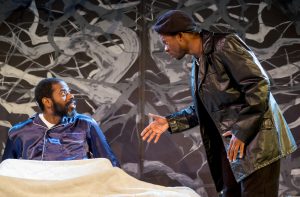Excellent Director’s Touch Fuels MOXIE’s ‘Blue Door’
“Kill a mule, you buy another,” reads a passage from Kenneth Morgan’s Slavery in America: A Reader and Guide — “kill a nigger, buy his brother.” The words cascade off the tongue like the molten lava they are, their nursery-rhyme cadence a wholesale indictment of the prepubescent idiot who thought them up.
The book was published in 2005, which means that hindsight has fed the implicit cruelty. Playwright Tanya Barfield apparently knows this — her Blue Door not only contains the passage but also captures the deadly racist climate the book describes throughout. Her considerable speechwriting talents take it from there, marking her play as the oratorical gem it is.
A dark 130-year history is brought to bear in this very, very good MOXIE Theatre entry — two fine performances fuel a great directorial effort that succeeds in its powerful feel for restraint.

Lewis (Vimel Sephus, left) gets schooled by brother Rex (Cortez L. Johnson) on his ancestry’s unrequited contributions to his life. Photo by Daren Scott.
A sleepless night is at hand as the apparitions coax Lewis from a reverie that explodes the walls of his lonely house.
Things end for the better as Lewis tentatively embraces the African American male experience — but the spirits had to pull some serious teeth to reach their goal. They include slave-born, sexually abused great-grandfather Simon; Simon’s boy Jesse, murdered for trying to vote; and Lewis’ father Charles, an alcoholic who witnessed his father’s death. Lewis’ brother Rex, who died of a drug overdose, turns Lewis’ head as he suggests that his brother’s success is a product of the abysmal row his forebears were forced to hoe.
Director Delicia Turner Sonnenberg… shrewdly and correctly lets the oratory drive the story…
Barfield deftly handles the cavalcade that confronts Lewis. For one thing, the characters are played by the same actor, pitting lone Lewis against only one theoretical adversary; they also tell distinctive histories amid the illusion of time even as Lewis contends that time itself is ever-changing. The playwright is clearly pulling for her lead guy, drawing him as a redeemable soul whose experiences with racism are eminently less severe and whose self-loathing and recalcitrance leave him one small step from enlightenment.
Director Delicia Turner Sonnenberg takes things a step further — she shrewdly and correctly lets the oratory drive the story, almost blatantly resisting the urge to make the characters pile on at Lewis’ expense. Sonnenberg is very much an actor’s director, and here, her Lewis gets the spotlight without reservation.
Lewis’ voice is at once a defense mechanism, a little too loud and almost discordant in its fits and starts; his eccentricities of genius are evident in his roll-of-the-eyes impatience and his perpetual frown of indecision. Vimel Sephus has these qualities down to a science in an excellent turn; his character’s physical attributes are glaring indicators of the turmoil within. As the ancestors, Cortez L. Johnson has the more colorful role as he darts in and out of family history. He has a difficult job straddling the characters’ traits and remaining true to himself at the same time, and he entirely succeeds as Sonnenberg firmly relegates his role to its proper subtext.

Playwright Tanya Barfield is pulling for Lewis’ enlightenment, and she gives him every chance to find it.
Simon’s mom was the one who suggested that blue paint around a doorframe keeps evil out of the home. A legend that long-lived must come to fruition almost of necessity — that’s exactly what unfolds at Blue Door, whose excellent perspectives provide equally abundant food for thought.
This review is based on the opening-night performance of Feb. 4. Blue Door runs through Feb. 26 at MOXIE Theatre, 6663 El Cajon Blvd. in the College Area. $30, group discounts available. 858-598-7620, moxietheatre.com.

Martin Jones Westlin, principal at editorial consultancy Words Are Not Enough and La Jolla Village News editor emeritus, has been a theater critic and editor/writer for 25 of his 47 years…
More…


